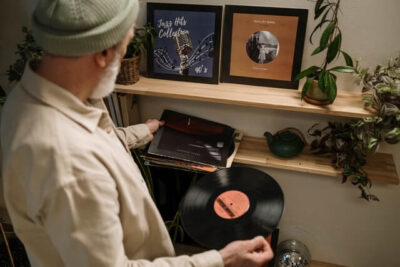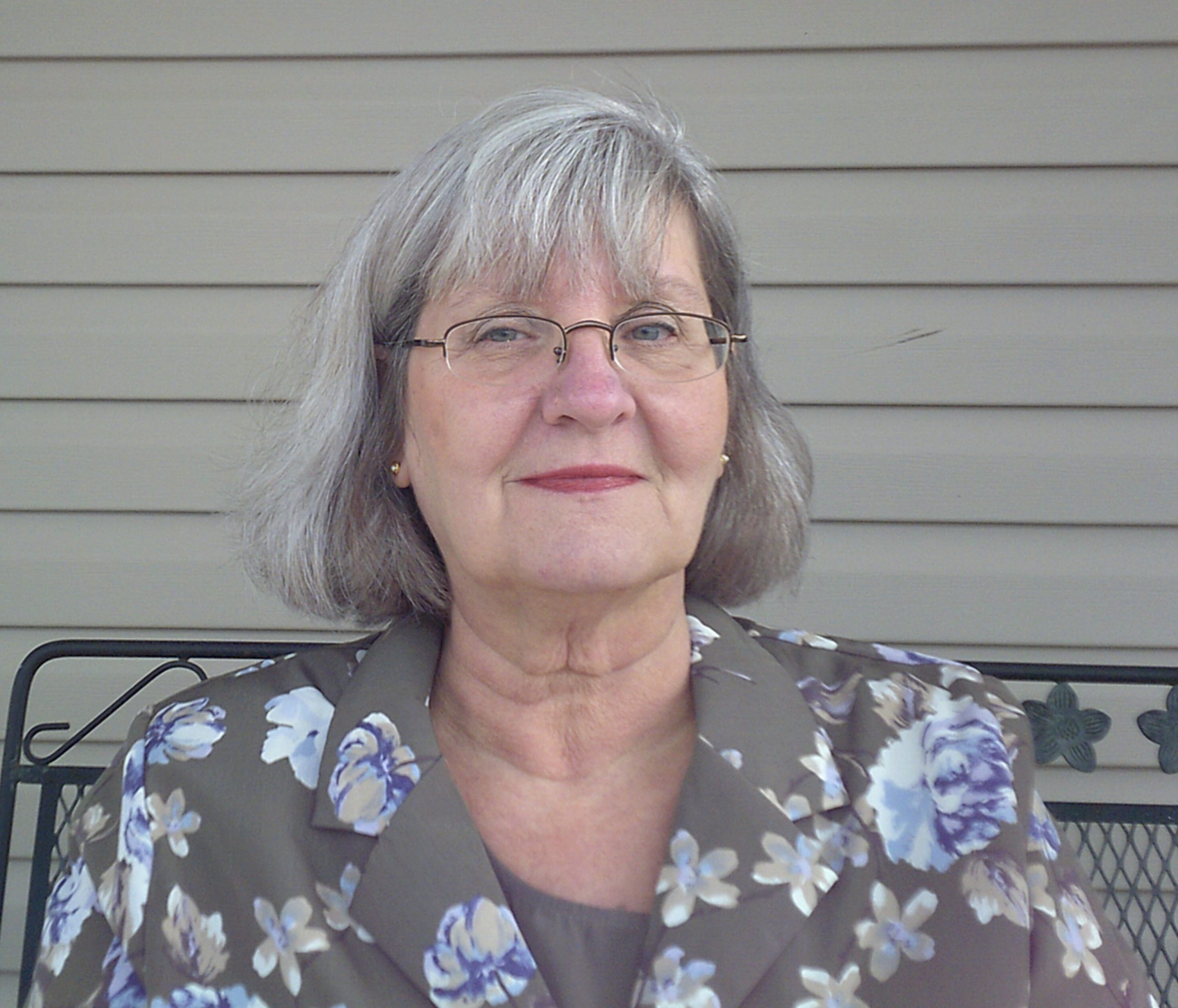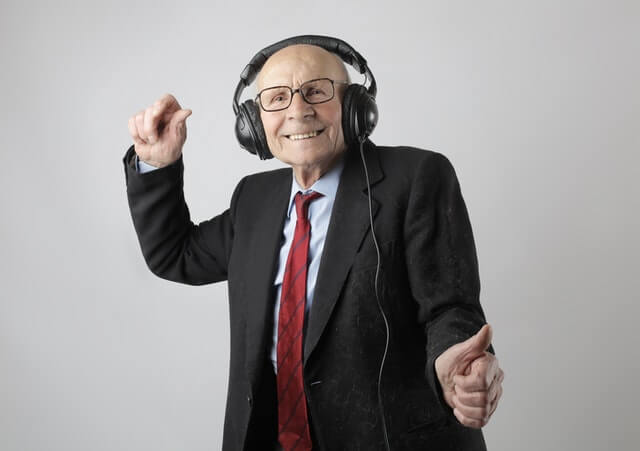Does Alzheimer’s Music Calm Agitation?
Years ago, I worked as the Director of Nursing in a nursing home. We had quite a few residents there who had dementia and most of them had some type of challenging behavior. We had people who would walk for days at a time, those who rummaged through drawers, those who would repeat the same thing over and over, but the ones who were the most challenging were the ones who would get agitated and aggressive. We stumbled across the power of Alzheimer’s Music therapy in our Dementia patients way back then.

Music Can Make them Happy
Recently I read an article about the calming effects of music with Dementia patients, and I remembered Walter. Walter was a big guy and was wheelchair bound. Most of the time he was easy going but he would get agitated and become very aggressive. He would run his wheelchair into others, push people, and curse and yell. One weekend he had a visitor, it was his brother from Chicago. He told me Walter used to be a musician and he loved music, especially the old blues music.
I bought Walter an MP3 player with headphones and loaded it with old blues music. I put them on him and started the music. His face lit up and he had a smile from ear to ear. He sat in his wheelchair nodding to the music and singing. I had found music soothed his soul. We added the MP3 player into his regular routine. What a difference it made with his behavior. His music made him happy.

There is a strong relationship between music, memory, and emotions
There have been many studies completed on music and it’s calming effect. They have found the music remembered the best, was from between 13 and 19 years, regardless of their year of birth.
Older adults have stronger emotional responses to the songs of their youth and a far greater ability to remember them in detail. Listening to the music of their youth has also been found to decrease depression in the elderly, especially songs they can sing to.

Alzheimer’s Music Videos
Please watch some of these videos to see what happens when they listen to music. Music can really make your life better!
Using music to help unlock Alzheimer’s patients’ memories
Alzheimer’s patient reacts to music
Music therapy helps elderly with Alzheimer’s and dementia recall long-term memories
Studying Effects of Music on Dementia Patients
Alzheimer patients turn to music therapy to help focus mind

Are you struggling with the stress of being a caregiver?
Becoming a better patient liaison for your loved one will help you get control over both of your lives!
The ALZlog phone app is coming soon, sign up to be notified when it is available

Dementia Growth increases the need for Alzheimer’s Music Therapy
Currently, over 50 million people worldwide suffer from dementia, with Alzheimer’s disease (AD) being the most common variant. This number is expected to triple by the year 2050. 70% of these people are being taken care of in the home by family members. It is so important for us to figure out how to keep them happy for their sake as well as the caregivers

Personalized Playlist
The first step is to try to figure out their favorite music. This is easier for spouses or children to come up with because they were around when they played some of their favorite music. If you are a caregiver for someone you were not around when they were younger, you may need to try different music that was played during their teen years to find what works best for them.
Once you have the list of songs for their playlist you will need to decide where to create the playlist and what type of device to use. You have a couple of options depending on whether you want to stream from the internet or just have the songs downloaded into an MP3 player.

Streaming Services- must have access to the internet
- YouTube – Has millions of songs from all different time periods and genres to choose from. It is available on a desktop computer and on mobile devices. You can build playlists and listen to your selected tunes anytime, anywhere if you are connected to the internet. There are ads in between the songs which can be distracting or annoying to someone with Dementia. If you want to remove the ads played before each video and enjoy the offline video playback feature, you can also subscribe to YouTube Music Premium. Here is a step-by-step guide on how to create a new playlist on YouTube.
- Spotify – A music-streaming site that also has millions of songs in its library. You can use Spotify on your desktop computer or on mobile devices. Like YouTube, you can also use it for free if you don’t mind the ads. Otherwise, there is also a premium version. See this webpagefor instructions on how to create a playlist on Spotify.
- Amazon Music Unlimited – If you have an Amazon Prime membership, you can use the service free of charge. Visit the Amazon Help & Customer Service page to learn how you can build a playlist.

Ready to Listen
Once you create a playlist and have it on your device, you are ready to get started. Make sure they have over the ear headphones that are soft and comfortable.
When they start listening to the music, you will want to pay attention to their reaction to the different songs, occasionally there will be a song that reminds them of a bad memory. If you run across that, it is best to remove that song.
Music can bring out many memories and emotions, your goal is to help connect to the happy memories. Many people are surprised at the difference music makes in their loved one.
Connect with your loved one through music
Music can help you connect with your loved one, especially if you are listening to the same songs together. If you get a splitter you can plug more than one headphone in and you can listen together!
I hope this information about music and Dementia will help add some happiness to both of your lives. Music is magical. Music can make you happy or sad. It can fill you with energy or lull you to sleep. It can remind you of better days, and it can help you relive your favorite memories from the past.
Music has been known to sooth the savage beast and it can calm the most agitated soul. Please use it daily in your Alzheimers home.
The Dementia Caregiver Blog Library
Activities, Advanced Directives, Agitation, Apathy, Approach, Apps for Caregivers, Basic Caregiving, Bathing, Bathroom Safety, Caregiver Burnout, Caregiver Compassion, Caregiver Emotions, Caregiver Help, Caregiver Loneliness, Caregiver Support, Cold & Flu Season, Communication Challenges, Dehydration, Dementia Complications, Dementia Doctors, Dementia Safety Home, Dementia Types, Dementia-Friendly, Dressing Issues, Driving Safety, Eating Problems, Fall Prevention, Family Help, Finances, Guns & Dementia, Harm Prevention, Healthcare, Help at Home, Hiding Dementia, Holidays, Hospice, Hospital Stay, In-Between Stage, Kitchen Safety, Laughter, Legal Healthcare, Marijuana use, Medication Tips, Music, Nutrition, Pain, Patience, Poop Problems, Relationships, Reminiscing, Routine, Safety, Sense of Purpose, Shadowing, Sleep Issues, Stages of Dementia, Sundowning, Television, Time Travel, Traveling, Toileting, Wandering
Exploring Caregiving Tools & Resources? Don't Forget to Check Out My Resource Page! 🌟

Hi, I’m Larea, a Certified Dementia Specialist and Registered Nurse with 30 years of hands-on experience helping dementia patients in various settings, from hospitals to nursing homes and hospice. Drawing on personal experiences with my family members and patients over the years, I’m here to help guide you on your caregiving journey.

